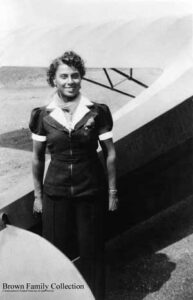Willa Beatrice Brown Chappell (1906-1992) was a groundbreaking African American aviator, influential civil rights activist, and dedicated aviation educator who shattered racial and gender barriers in the skies and on the ground. Born in Glasgow, Kentucky, Brown’s remarkable career of “firsts” left an indelible mark on American aviation history.
A lifelong advocate for equality, Willa Brown earned her pilot’s license in 1937, becoming the first African American woman in the United States to be licensed. She further distinguished herself by obtaining a commercial  pilot’s license in 1939 and, by 1943, held the unique distinction of being the first woman in the U.S. with both a commercial pilot’s license and an aircraft mechanic’s license.
pilot’s license in 1939 and, by 1943, held the unique distinction of being the first woman in the U.S. with both a commercial pilot’s license and an aircraft mechanic’s license.
Brown’s passion extended beyond personal achievement. Recognizing the systemic segregation in aviation, she co-founded the National Airmen’s Association of America (NAAA) in 1937, an organization instrumental in advocating for the inclusion of Black Americans in the military’s aviation programs. In 1938, alongside Cornelius Coffey, she co-founded the Coffey School of Aeronautics in Chicago, the first private flight training academy owned and operated by African Americans.
Through the Coffey School, Willa Brown played a pivotal role in training hundreds of aspiring pilots. Her tireless efforts and the school’s success were directly responsible for providing a critical pipeline of Black aviators to the Civilian Pilot Training Program (CPTP) and ultimately to the formation of the legendary Tuskegee Airmen. She trained approximately 200 future Tuskegee Airmen cadets and instructors, earning her the moniker “Maker of Pilots.”
Willa Brown’s story is told at Aviation Heritage Park with a fully restored Piper Cub on display. Program video courtesy of WNKY Television. Program research and narration by Telia Butler.
Brown’s influence reached national levels. She tirelessly lobbied the U.S. government for the integration of the Army Air Corps and fought against the prevailing racist notion that African Americans were unfit to fly. In 1941, she became the first African American officer in the Civil Air Patrol (CAP), commissioned as a Lieutenant, and was named federal coordinator of the CAP Chicago unit. Her advocacy contributed significantly to President Harry Truman’s Executive Order 9981 in 1948, which ended racial segregation in the U.S. military.
Beyond aviation, Willa Brown was a committed civil rights leader. In 1946, she made history as the first African American woman to run for the United States Congress in a primary election, campaigning on a platform of improving opportunities for Black Americans. She continued to teach aviation and business until her retirement in 1971. In recognition of her immense contributions, she was appointed to the Federal Aviation Administration (FAA) Women’s Advisory Board in 1972.
Willa Brown’s legacy as a pioneer, instructor, and unwavering advocate for equality continues to inspire generations of aviators and civil rights champions. She passed away on July 18, 1992, at the age of 86, leaving behind a remarkable story of courage, perseverance, and groundbreaking achievement.




